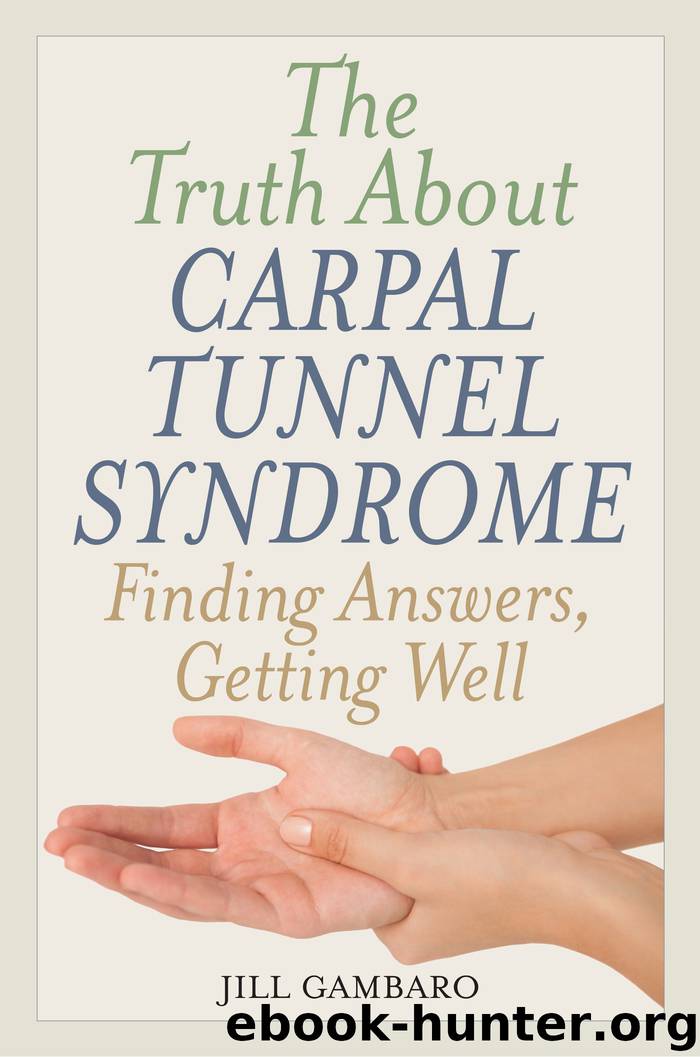The Truth About Carpal Tunnel Syndrome by Jill Gambaro

Author:Jill Gambaro
Language: eng
Format: epub
Tags: undefined
Publisher: Rowman & Littlefield Publishers
Published: 2012-03-14T16:00:00+00:00
The System Violates Workers’ Constitutional Rights
With implementation of this system, workers were made to give up their right to due process, something we give criminals every day, when the lawyers got rid of jury trials. The accountants wanted to be able to predict how much money work-related injuries were going to cost, so they created a schedule of payments according to severity of the injury. In addition, treatment guidelines, a fairly recent addition to the system, today place control of the injured workers’ health care in the hands of system-selected panels, not doctors. The fees lawyers could charge to represent workers were significantly reduced to decrease litigation costs for injured workers, except these fees are based upon a percentage of the workers’ final award, so the only ones to save money were the insurance companies. It also makes most of that representation inadequate because the better lawyers go for the higher-paying areas of practice. Workers’ compensation lawyers fall far below ambulance chasers in terms of percentage collected. After a few tries, workers’ compensation lawyers did manage to debunk the unholy trinity, especially the one about assumed risk. It was touted as a victory for workers at the time, when really it was a circumvention of the US constitution from the start.
As bad as it was at inception, once insurance companies stepped in to provide coverage for employers and the system played out, major problems became immediately apparent: the injured worker, as the plaintiff, must prove that she’s been injured on the job, just like anyone suing anyone else in this country—except, in the workers’ compensation system, you have to use a doctor approved by the insurance company to do this, a doctor with an inherent conflict of interest. And there’s another catch. The insurance company owes a duty to its policyholder to act in “good faith.” With every other type of insurance, you are the policyholder, and you have leverage against the insurance company if it’s not doing what it said it would do when it sold you the policy. You can take it to court, and insurance companies tend not to do very well in front of juries.
In the workers’ compensation system, however, the insurance companies don’t have a duty to act in good faith in the interests of the injured worker; they owe that to the employer because the employer is the policyholder. And because the system eliminated jury trials, you cannot take an insurance company to court if it is acting in bad faith. To make matters worse, employers have a strong incentive to deny workers’ injuries; otherwise, their premiums will go up. Finally, because the attorneys who represent workers can only get paid so much, they can’t afford to spend much time on each case. In sum: When your claim is investigated, the insurance company asks your boss if you got hurt on the job. If your boss says no, the insurance company denies the claim, forcing the injured worker to take the case to court. It’s a tactic insurance companies call “starving you out.
Download
This site does not store any files on its server. We only index and link to content provided by other sites. Please contact the content providers to delete copyright contents if any and email us, we'll remove relevant links or contents immediately.
Men In Love by Nancy Friday(4342)
Everything Happens for a Reason by Kate Bowler(4076)
The Immortal Life of Henrietta Lacks by Rebecca Skloot(3834)
Why We Sleep by Matthew Walker(3782)
The Sports Rules Book by Human Kinetics(3597)
Not a Diet Book by James Smith(2744)
The Emperor of All Maladies: A Biography of Cancer by Siddhartha Mukherjee(2440)
Sapiens and Homo Deus by Yuval Noah Harari(2423)
Day by Elie Wiesel(2251)
Endless Forms Most Beautiful by Sean B. Carroll(2089)
Angels in America by Tony Kushner(2054)
A Burst of Light by Audre Lorde(1984)
Hashimoto's Protocol by Izabella Wentz PharmD(1903)
Dirty Genes by Ben Lynch(1862)
Reservoir 13 by Jon McGregor(1859)
Stretching to Stay Young by Jessica Matthews(1719)
Fat for Fuel by Joseph Mercola(1701)
The Immune System Recovery Plan by Susan Blum(1700)
Boost Your Brain Power in 60 Seconds by Michelle Schoffro Cook(1681)
